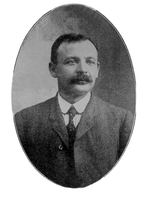William E. Trautmann, Date of Birth, Place of Birth, Date of Death
TweetWilliam E. Trautmann
 Date of Birth: 01-Jul-1869
Date of Birth: 01-Jul-1869
 Place of Birth: New Zealand
Place of Birth: New Zealand
Date of Death: 18-Nov-1940
Profession: trade unionist
Nationality: United States, Germany, New Zealand
Zodiac Sign: Cancer 
About William E. Trautmann
- William Ernst Trautmann (July 1, 1869 – November 18, 1940) was founding general-secretary of the U.S.
- Industrial Workers of the World (IWW) and one of 69 people who initially laid plans for the organization in 1904. He was born to German parents in New Zealand in 1869 and raised in Europe.
- After completing a brewing apprenticeship in Poland, he worked as a masterbrewer in Germany before being expelled for labor activities under Bismark's anti-socialist laws.
- In 1890 he moved to the United States, where he joined the Brewers Union.
- Trautmann was a key figure in the United Brewery Workers' Union in Milwaukee and the editor of the United Brewery Workers' German-language newspaper, Brauer Zeitung.
- He was expelled from that union for his participation in the founding IWW convention.
- In 1905, he joined with other industrial unionists to found the Industrial Workers of the World.
- Between 1905 and 1912, he mostly worked in the field as an organizer.
- In 1912, he broke with the IWW leadership over strike tactics and the alleged misuse of funds collected for the "Bread and Roses" strike in Lawrence, Massachusetts.
- In 1913, Trautmann joined the so-called yellow IWW created by the Socialist Labor Party, which later became the Workers' International Industrial Union (WIIU), as a "full-time propagandist."In 1922 Trautmann published a novel, Riot, drawing on his experiences as an IWW activist during the Pressed Steel Car Strike of 1909 in McKees Rocks (Pittsburgh, Pennsylvania).
Read more at Wikipedia
See Also
- Famous People's Birthdays on 01 July, New Zealand
- Famous People's Birthdays in July, New Zealand
- Famous People's Birthdays on 01 July, United States
- Famous People's Birthdays in July, United States
- Famous People's Birthdays on 01 July, Germany
- Famous People's Birthdays in July, Germany
- Famous trade unionist's Birthdays on 01 July, New Zealand
- Famous trade unionist's Birthdays in July, New Zealand
- Famous trade unionist's Birthdays on 01 July, United States
- Famous trade unionist's Birthdays in July, United States
- Famous trade unionist's Birthdays on 01 July, Germany
- Famous trade unionist's Birthdays in July, Germany

